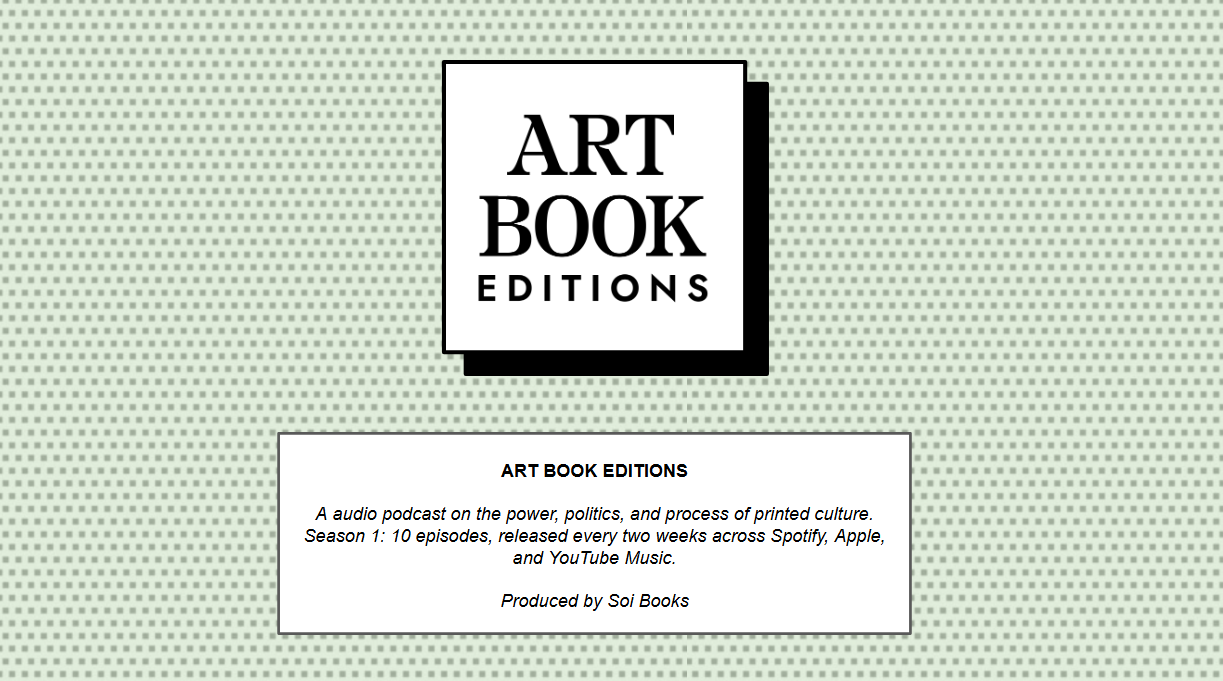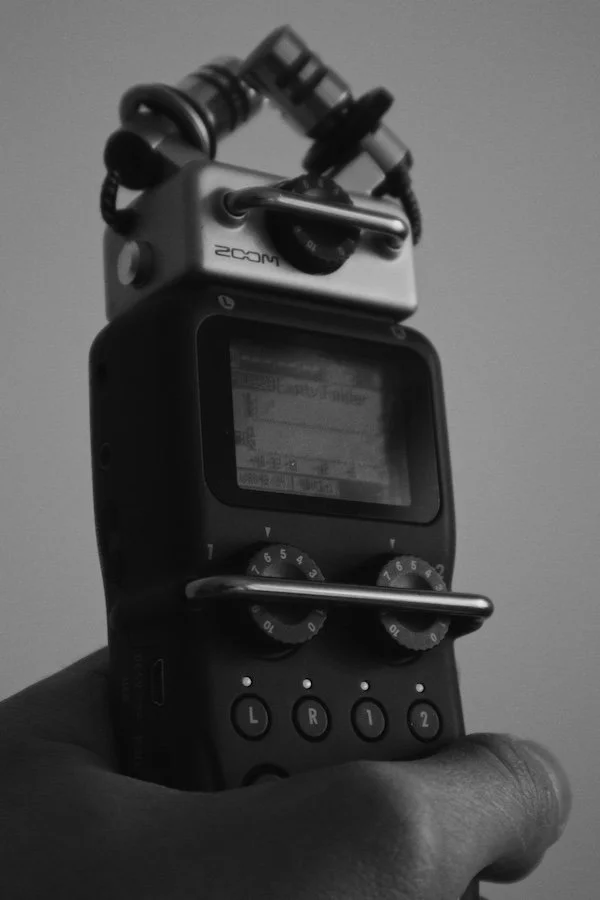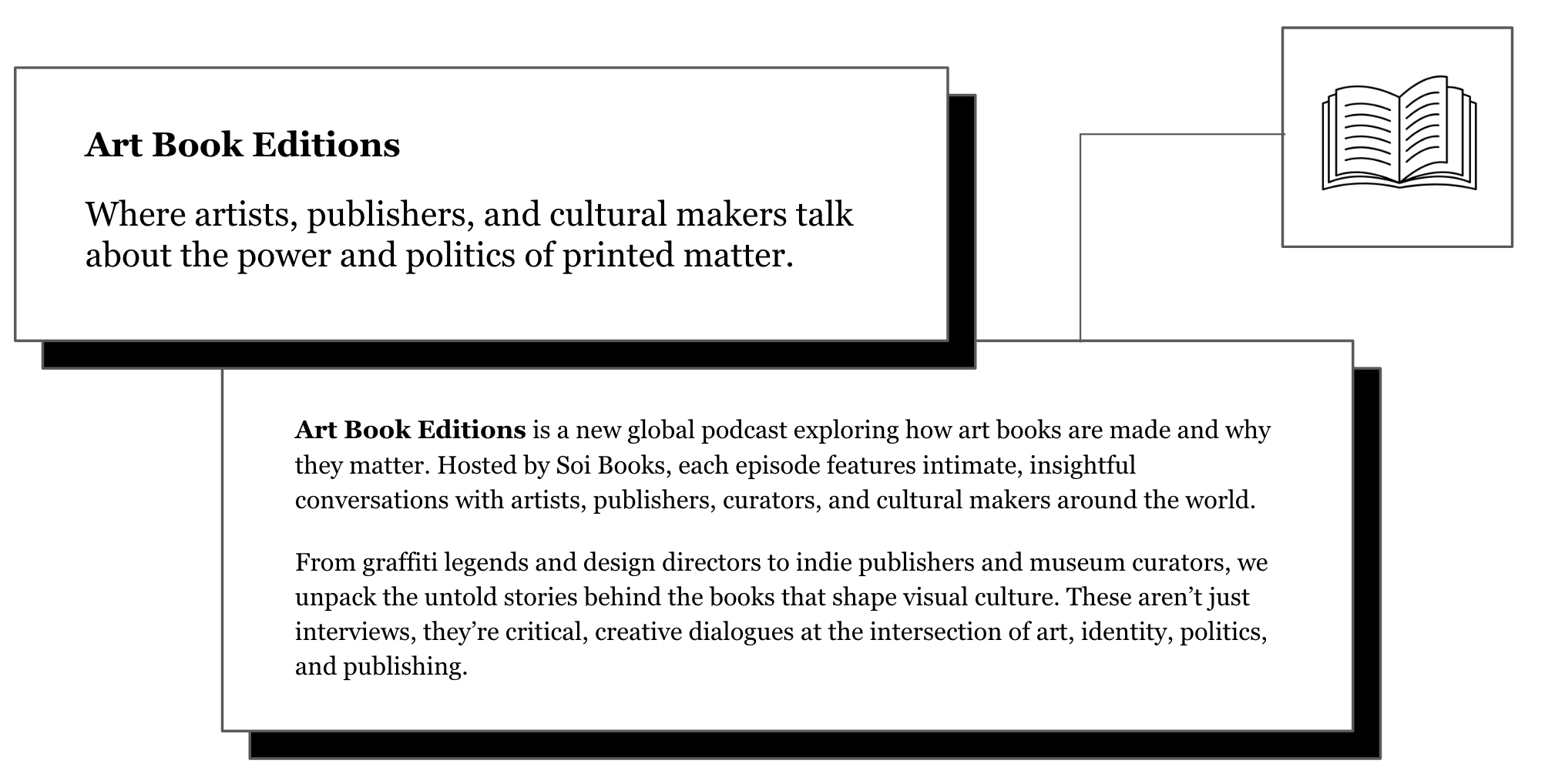Starting a Podcast: What We Learned the Hard Way
Podcasts are everywhere. So why add another one? Because the world of art books, independent publishing, and creative culture doesn’t yet have a home in audio and that’s about to change.
We’re launching the Art Book Editions Podcast: a series of conversations with artists, publishers, authors, and curators shaping visual culture today. If you’ve ever wondered how art books get made, why artists turn to publishing as a medium, or what it means to make culture outside the mainstream, this podcast is for you.
From Video to Audio
We used to live and breathe video. Big-budget commercials, feature documentaries, short fiction films. We were priming ourselves to step fully into that world. Then the landscape shifted. Video became easier, faster, more accessible, and honestly, we fell out of love with the commercial side of it. By the time the pandemic rolled around, we had put all our eggs into publishing instead.
That’s a longer story for another day, but books have always been close to us. We’ve written them, designed them, lived alongside publishing for years. So when the idea of a podcast came up as a way to highlight the artists, authors, publishers, and journalists we admire, it seemed obvious.
We already had equipment. We knew how to edit. We knew how to make things look (and sound) sharp. Add in today’s AI tools, and we figured it would be a breeze.
We were wrong.
Video Habits Die Hard
At first, we thought we’d do it the video way. Two episodes in, and it was a draining mess: setting up lights, testing locations, making sure guests thought about their setup as much as we did. It was overkill. Hours wasted, energy drained.
It took a friend in Berlin, Andreas Vierheller, who runs the excellent Beans & Books podcast to bring us back to basics. We met at Miss Read in 2024, and he planted the seed: “Just do an audio pod.” At the time, we brushed it off. Surely we knew better? Fast-forward a year, and he was right.
So here we are: recording an audio-only podcast with nothing more than a Zoom recorder, old headphones, and Riverside.fm.
Our trusty Zoom, photo by Roman Skrypnyk.
What Surprised Us
The funny thing is, having years of video experience didn’t really make podcasting easier. Time is still time. Editing, distribution, scheduling, promotion. They all take hours you don’t always have when you’re also making books, working with artists, and trying to be present for family.
But one unexpected joy has been the conversations themselves. We’ve been around the block long enough to have a strong network, but you don’t often get to spend a solid, uninterrupted hour with old collaborators or friends. The podcast has given us an excuse to do just that. It’s deepened relationships and created space for conversations we didn’t even know we needed.
Why You Should Listen
We don’t just want this to be about us reconnecting with people. We want it to be valuable for you. Each episode of the Art Book Editions Podcast offers:
Behind-the-scenes stories of how art books get made.
Honest conversations with artists and publishers about their creative journeys.
Cultural insights into how books shape identity, resistance, and belonging.
Practical inspiration for anyone thinking of starting their own creative or publishing project.
Why We’re Doing It
We’re not expecting to reinvent the wheel here. We’re starting from zero listens, and we’re realistic. The goals are simple:
Build community by sharing stories across our network.
Promote our books and the work of the artists we collaborate with.
Enjoy the process and find creative satisfaction in something new.
And yes, one day it would be nice if there’s a revenue stream attached but that’s not the driver right now.
Like most things we do, it comes down to curiosity, creativity, and connection.
What We’ve Learned (So Far)
If you’re a creative or publisher thinking about starting a podcast, our one piece of advice is: make it easy for yourself. Don’t rush out and buy kit. Use what you already have. Record a few episodes, get a feel for the rhythm, and only invest once you know it’s something you want to keep doing. There are so many free tools and platforms out there, lean on those.
And honestly, check back with us in a year. We’re still learning, so who are we to talk!
Season One: Art Book Editions
Right now, we’re in the middle of recording Season 1 of the Art Book Editions Podcast. The conversations have been surprising, inspiring, and sometimes a little chaotic, just how we like it. Guests include:
Darbotz — Indonesian graffiti icon and global brand collaborator.
Colin Steven — founder of Velocity Press and the legendary Knowledge magazine.
Kasper Ledet — Danish designer and art director for To Øl Brewery.
Remi Rough — British abstract artist, and author.
Andreas Vierheller — host of Germany’s Beans & Books podcast and co-founder of Offbeat Publishing.
Dwayne Fields FRGS — explorer, broadcaster, and author.
Jordan Markuzi — publisher and creative producer based in Jakarta.
…and more to come.
These aren’t just names, they’re people we’ve worked with, been inspired by, or admired from a distance. The podcast is our chance to dig deeper, ask the questions we’ve always wanted to, and bring those stories to a wider audience.
Wrapping Up
Starting a podcast wasn’t as easy as we thought. But it looks like it could be exactly what we hoped: a space to highlight voices in art, publishing, and culture, and a reason to reconnect with the people who make those worlds move.
If you’re an artist, publisher, author, or simply curious about the creative forces behind art books, we’d love you to join us on this journey.
The Art Book Editions Podcast, 35–50 minutes of conversation, released every two weeks, available on Spotify, Apple Podcasts, YouTube Music, Amazon Music, and all major platforms.
Subscribe now so you don’t miss the first drop.




